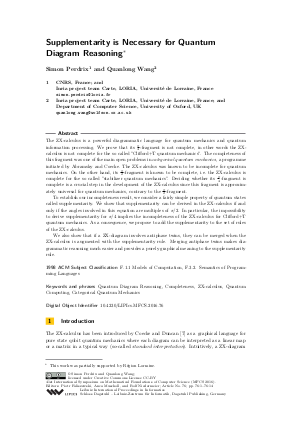Supplementarity is Necessary for Quantum Diagram Reasoning
Authors Simon Perdrix, Quanlong Wang
-
Part of:
Volume:
41st International Symposium on Mathematical Foundations of Computer Science (MFCS 2016)
Part of: Series: Leibniz International Proceedings in Informatics (LIPIcs)
Part of: Conference: Mathematical Foundations of Computer Science (MFCS) - License:
 Creative Commons Attribution 3.0 Unported license
Creative Commons Attribution 3.0 Unported license
- Publication Date: 2016-08-19
File

PDF
LIPIcs.MFCS.2016.76.pdf
- Filesize: 0.53 MB
- 14 pages
Document Identifiers
Subject Classification
Keywords
- quantum diagram reasoning
- completeness
- ZX-calculus
- quantum computing
- categorical quantum mechanics
Metrics
- Access Statistics
-
Total Accesses (updated on a weekly basis)
0Document
0Metadata
Abstract
The ZX-calculus is a powerful diagrammatic language for quantum mechanics and quantum information processing. We prove that its pi/4-fragment is not complete, in other words the ZX-calculus is not complete for the so called "Clifford+T quantum mechanics". The completeness of this fragment was one of the main open problems in categorical quantum mechanics, a programme initiated by Abramsky and Coecke. The ZX-calculus was known to be incomplete for quantum mechanics. On the other hand, its pi/2-fragment is known to be complete, i.e. the ZX-calculus is complete for the so called "stabilizer quantum mechanics". Deciding whether its pi/4-fragment is complete is a crucial step in the development of the ZX-calculus since this fragment is approximately universal for quantum mechanics, contrary to the pi/2-fragment. To establish our incompleteness result, we consider a fairly simple property of quantum states called supplementarity. We show that supplementarity can be derived in the ZX-calculus if and only if the angles involved in this equation are multiples of pi/2. In particular, the impossibility to derive supplementarity for pi/4 implies the incompleteness of the ZX-calculus for Clifford+T quantum mechanics. As a consequence, we propose to add the supplementarity to the set of rules of the ZX-calculus. We also show that if a ZX-diagram involves antiphase twins, they can be merged when the ZX-calculus is augmented with the supplementarity rule. Merging antiphase twins makes diagrammatic reasoning much easier and provides a purely graphical meaning to the supplementarity rule.
Cite As Get BibTex
Simon Perdrix and Quanlong Wang. Supplementarity is Necessary for Quantum Diagram Reasoning. In 41st International Symposium on Mathematical Foundations of Computer Science (MFCS 2016). Leibniz International Proceedings in Informatics (LIPIcs), Volume 58, pp. 76:1-76:14, Schloss Dagstuhl – Leibniz-Zentrum für Informatik (2016)
https://doi.org/10.4230/LIPIcs.MFCS.2016.76
BibTex
@InProceedings{perdrix_et_al:LIPIcs.MFCS.2016.76,
author = {Perdrix, Simon and Wang, Quanlong},
title = {{Supplementarity is Necessary for Quantum Diagram Reasoning}},
booktitle = {41st International Symposium on Mathematical Foundations of Computer Science (MFCS 2016)},
pages = {76:1--76:14},
series = {Leibniz International Proceedings in Informatics (LIPIcs)},
ISBN = {978-3-95977-016-3},
ISSN = {1868-8969},
year = {2016},
volume = {58},
editor = {Faliszewski, Piotr and Muscholl, Anca and Niedermeier, Rolf},
publisher = {Schloss Dagstuhl -- Leibniz-Zentrum f{\"u}r Informatik},
address = {Dagstuhl, Germany},
URL = {https://drops.dagstuhl.de/entities/document/10.4230/LIPIcs.MFCS.2016.76},
URN = {urn:nbn:de:0030-drops-65062},
doi = {10.4230/LIPIcs.MFCS.2016.76},
annote = {Keywords: quantum diagram reasoning, completeness, ZX-calculus, quantum computing, categorical quantum mechanics}
}
